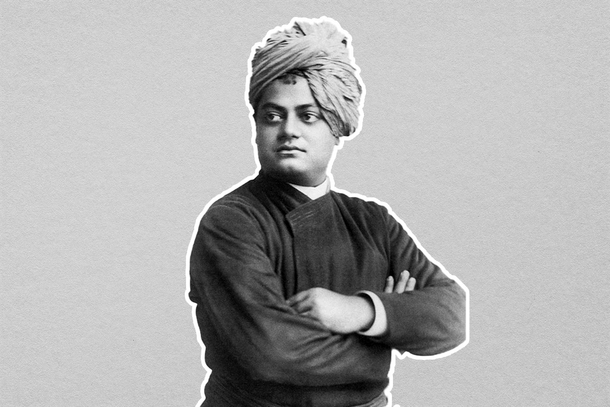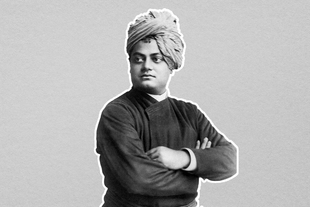Commentary
Actualising Vivekananda - How Narendra 1.0 Has Inspired Narendra 2.0's Politics And Policies
Banuchandar Nagarajan
Jan 12, 2024, 05:49 PM | Updated 07:59 PM IST
Save & read from anywhere!
Bookmark stories for easy access on any device or the Swarajya app.


"The man who influences, who throws his magic, as it were, upon his fellow-beings, is a dynamo of power, and when that man is ready, he can do anything and everything he likes: that personality put upon anything will make it work" ~ Swami Vivekananda
Every physicist's theory needs an engineer's determined execution for his ideas to become inventions. The semiconductor effect observed by Faraday and Braun etc., almost two centuries ago, has been put into use ubiquitously in the gadgets we see around us by great inventors. The engineer or the inventor takes in the theory and grapples with a host of "real-world" problems to produce useful output. In the process, the engineer inspires others by their visible successes and kick-off virtuous cycles.
The above template suits the world of philosophy, religion, economics and politics also. There are theoreticians that have held sway for centuries and continue to do so over practitioners. For example, the scale of destruction unleashed by dictators that swore by the philosophies of Karl Marx is incalculable.
But, in spite of communism, the world has become a better place. This means, political leaders rooted in their own cultures have risen up from time to time to provide direction to societies and have saved us from collective doom.
There are rare instances, when a once-in-a-lifetime political leader actualizes the ideals of a once-in-a-lifetime-philosopher. That is the story of Narendra Modi becoming inspired by the teachings of Swami Vivekananda and putting what he learned to practice on a grand scale. Today (12th January) is Swami ji's 161st birth anniversary. Let us attempt to remember the teachings of the guru through the actions of the shishya.
A bit of flashback first! PM Modi stayed at Ramakrishna Mission when he was teenager, with the aim of becoming a monk. But Swami Atmasthananda, who would later on head the Ramakrishna Mission, exhorted young Modi to serve by being among people.
A young Modi used to assiduously collect quotes of Swami Vivekananda in his diary. In 1993, he was even invited to the United States for the centennial celebrations of the Chicago speech. 9/11 (September 11), the day of the delivery of the speech was "Vishwa Vijay Diwas" for him.
In one of his best speeches, made on 12th January, 2017, PM Modi in his inimitable style, encapsulating the vision of Swami ji, said, "A meek person is akin to one who completes his life standing on the shore and counting the waves, instead of jumping in and learning to swim." He said how Swami ji's correspondence with Jamshedji Tata was the first spark of "Make in India". (Here is a list of PM Modi's policies that seems to have been inspired by Swami ji)
Let us look at 10 striking commonalities in the two.
1. Radical ideas and ceaseless propagation: Out of the box thinking and making any idea a movement with continuous campaigns and speeches is one such feature. PM Modi takes the leaf out of preachers and never has taken the approach of "strategic pause" as prescribed by modern-day consultants.
2. On Developed India: Swami ji's "Prabhuddha Bharat" vs. Modi ji's "Viksit Bharat Sankalp" are similar. Both believed that India's place in the world will be on the basis of her spiritual strength. Both believed in the power of "Yuva Shakti" to propel India.
3. Role of India in the world: Swami ji said that he has brought forward the collective voice of "One Asia" or the "East". He prescribed India's "Sattva" to the West. Both Swami ji's trip to the West and PM Modi's last 10 years in pursuing a strong "India First Policy" have been described in some way or other as a "counter attack from the east".
4. Organization building: Both the organisations that they moulded -The Ramakrishna Mission and Bharatiya Janata Party - strive to balance "the advantages of a sect and broadness of ideology" by being disciplined and at the same time being open to innovation.
5. Rooted, but extremely welcoming of modernity: Both travelled abroad in their formative years. PM Modi's use of technology is well-known. Both abhorred the "frog in the well" mentality. PM Modi captured it well with the epithet, "Upanishad se Upgrah (satellite) tak".
6. Love for Poetry: Both are more than amateur poets. Poetry collections of both men are available as books.
7. Devi worship: Swami ji wrote poems on Maa Kali. PM Modi's stern fasting during Navratras is well-known.
8. Unconventional and original: Both were authentic and preserved their core personalities. Both were big dreamers. They untiringly developed capacities in themselves to excel. Swami ji dared to cross the seas to deliver the "Brothers and Sisters of America" speech in Chicago. PM Modi's approach to campaigns and governance have been unique and "out of the box".
9. National service/"garib kalyan": Both believe that the soul of every action should be for serving "daridra narayan" or "antyodaya", as phrased later. Both combined personal spiritual practice with larger moral and social responsibilities.
10. "Never Give Up": Swami ji spent nights in a freight wagon in the US. He was penniless, friendless and was starving in a foreign land during the early days of his visit. He wandered as a bhikshu in the streets of Chicago. PM Modi too faced enormous financial difficulties and has mentioned that he has lived on alms once. To rise from the depths to do world-beating stuff is heroic.
So, how do we actualise Swami Vivekananda?
The primary student himself said, in 2015, at Kuala Lampur, "I do not believe that Swami Vivekananda can enter within us through my words or through anyone's. Vivekananda - that is not just a person's name; not just an identification of a system. In a way, Vivekananda is the symbol of the thousands-of-years-old spirit of ancient India.” Not very helpful, one might think! How can once even make sense of the "spirit of India" that is eternal and at the same time amorphous?
Perhaps, it is about beginning to engage dispassionately in public service and keep improving along the way. Swami ji himself posited that the goal of Vedanta that he propagated, was to unlock the secret of work and in dispassionate work there is no sin but only error. Right action is the key to realize our essential divinity. So, the question is not the number of books one reads, but how much one puts into practice for a larger cause.
A commentary like this may sound like a panegyric to a successful leader. But feelings have to be expressed and truths be told.
The Prime Minister is the "Man in the Arena", as Teddy Roosevelt put it, who is guided by the teachings of the Great Monk that preached ceaseless activity in service of the public. Both will continue to inspire generations to come. And may we all get a "double-engine" inspiration!
Banuchandar is a political and public policy advisor. He posts at @Banu4Bharat.





